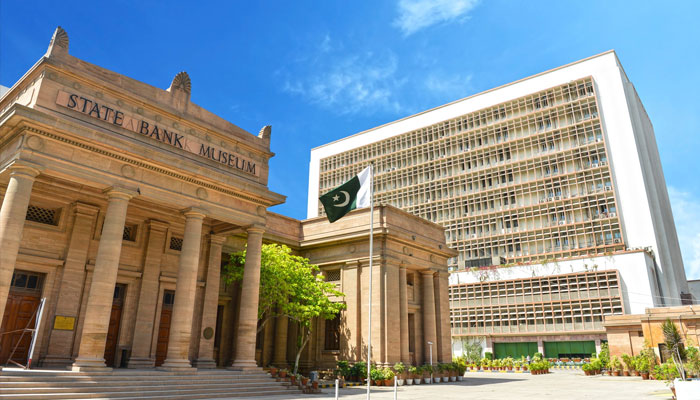Banking sector well-positioned to drive economic development: SBP
KARACHI: State Bank of Pakistan Governor Jameel Ahmad has said that the banking sector is well positioned with regard to solvency, asset quality and profitability to support the country’s economic growth and development, a statement said.
The SBP governor made this statement at the launch of an analysis titled ‘Banking on our Banks: Aligning Growth with Development’ that was conducted by CERP and Alchemy Technologies with support from the Pakistan Banks’ Association (PBA). The event was held on Wednesday.
“Our banking sector is well positioned in terms of solvency, asset quality and profitability to contribute to the economic growth and development of Pakistan by embracing technology and fostering innovation. While remaining focused on governance and risk management, we can enhance the capacity and resilience of our banking sector to serve all segments of the economy,” Ahmad said.
Chairman of the PBA Zafar Masud said it is important to recognise that Pakistan’s banks operate in a challenging environment, with 52 per cent of the undocumented economy and many sectors actively avoiding the tax net.
“Despite these challenges, the banking sector continues to contribute generously to the national exchequer and fiscal deficit, with a willingness to do even more through income-based taxes than the taxes on balance sheet like the ADR,” Masud said.
“This level of commitment is rare, especially in emerging economies like ours, and deserves recognition and applause,” he added.The analysis suggests that the key to increasing the effectiveness of Pakistan’s banks is innovation, financial inclusion, lending to SMEs, and progressive banking regulations.
“The truth is that changing rules doesn’t change behaviour, incentives do. With the right data and solutions, we can build a unified banking ecosystem ready to fuel Pakistan’s economic recovery,” said Maroof A Syed, president and CEO of CERP.
The event also included panel discussions, which highlighted regulatory challenges, the high costs associated with digitalisation and the resulting overreliance on unprofitable sectors. However, with well-implemented and strategic reforms, these issues can be addressed, reducing frictional costs and enhancing banks’ long-term competitiveness.
“We need market-driven incentives, robust regulatory frameworks, forward-looking boards and a sandbox approach to experimentation. Otherwise, banks will continue to prioritise comfort lending over bold decisions necessary for economic transformation,” said Jawwad Farid, CEO at Alchemy Technologies and Professor of Practice at IBA.
-
 Trump Announces A Rise In Global Tariffs To 15% In Response To Court Ruling, As Trade Tensions Intensify
Trump Announces A Rise In Global Tariffs To 15% In Response To Court Ruling, As Trade Tensions Intensify -
 Chappell Roan Explains Fame's Effect On Mental Health: 'I Might Quit'
Chappell Roan Explains Fame's Effect On Mental Health: 'I Might Quit' -
 AI Processes Medical Data Faster Than Human Teams, Research Finds
AI Processes Medical Data Faster Than Human Teams, Research Finds -
 Sarah Ferguson’s Friend Exposes How She’s Been Since Andrew Mountbatten-Windsor’s Release
Sarah Ferguson’s Friend Exposes How She’s Been Since Andrew Mountbatten-Windsor’s Release -
 Jelly Roll Explains Living With 'severe Depression'
Jelly Roll Explains Living With 'severe Depression' -
 Charli XCX Applauds Dave Grohl’s 'abstract' Spin On Viral ‘Apple’ Dance
Charli XCX Applauds Dave Grohl’s 'abstract' Spin On Viral ‘Apple’ Dance -
 Anna Sawai Opens Up On Portraying Yoko Ono In Beatles Film Series
Anna Sawai Opens Up On Portraying Yoko Ono In Beatles Film Series -
 Eric Dane's Wife Rebecca Gayheart Shares Family Memories Of Late Actor After ALS Death
Eric Dane's Wife Rebecca Gayheart Shares Family Memories Of Late Actor After ALS Death -
 Palace Wants To ‘draw A Line’ Under Andrew Issue: ‘Tried And Convicted’
Palace Wants To ‘draw A Line’ Under Andrew Issue: ‘Tried And Convicted’ -
 Eric Dane's Girlfriend Janell Shirtcliff Pays Him Emotional Tribute After ALS Death
Eric Dane's Girlfriend Janell Shirtcliff Pays Him Emotional Tribute After ALS Death -
 King Charles Faces ‘stuff Of The Nightmares’ Over Jarring Issue
King Charles Faces ‘stuff Of The Nightmares’ Over Jarring Issue -
 Sarah Ferguson Has ‘no Remorse’ Over Jeffrey Epstein Friendship
Sarah Ferguson Has ‘no Remorse’ Over Jeffrey Epstein Friendship -
 A$AP Rocky Throws Rihanna Surprise Birthday Dinner On Turning 38
A$AP Rocky Throws Rihanna Surprise Birthday Dinner On Turning 38 -
 Andrew Jokes In Hold As BAFTA Welcomes Prince William
Andrew Jokes In Hold As BAFTA Welcomes Prince William -
 Sam Levinson Donates $27K To Eric Dane Family Fund After Actor’s Death
Sam Levinson Donates $27K To Eric Dane Family Fund After Actor’s Death -
 Savannah Guthrie Mother Case: Police Block Activist Mom Group Efforts To Search For Missing Nancy Over Permission Row
Savannah Guthrie Mother Case: Police Block Activist Mom Group Efforts To Search For Missing Nancy Over Permission Row




